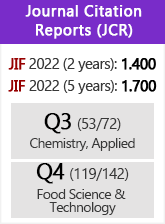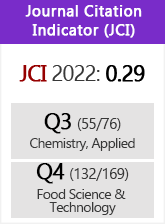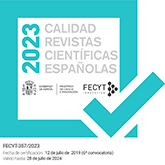Solid fat content determination: Comparison between pNMR and DSC techniques
DOI:
https://doi.org/10.3989/gya.1995.v46.i6.949Keywords:
Differential Scanning Calorimetry, Pulsed Nuclear Magnetic Resonance, Quality control, Solid fat (content), Techniques (comparison)Abstract
Differential Scanning Calorimetry (DSC) has been one of the most popular thermal analysis techniques during the last two decades. The present work shows the utilization of DSC on the determination of solid fat content in fats. Solid fat content values were calculated through the partial areas of DSC heating curves. In a comparison with pulse NMR values, DSC values were generally higher than the pNMR ones. Differences between samples and the techniques themselves seems to be responsible for this fact. DSC is a fast technique on solid fat content, characteristic temperatures and phase transitions enthalpies determinations besides giving a characteristic curve of each sample.
Downloads
Download data is not yet available.
Downloads
Published
1995-12-30
How to Cite
1.
Tieko Nassau R, Guaraldp Gonçalves LA. Solid fat content determination: Comparison between pNMR and DSC techniques. Grasas aceites [Internet]. 1995Dec.30 [cited 2024Apr.17];46(6):337-43. Available from: https://grasasyaceites.revistas.csic.es/index.php/grasasyaceites/article/view/949
Issue
Section
Research
License
Copyright (c) 1995 Consejo Superior de Investigaciones Científicas (CSIC)

This work is licensed under a Creative Commons Attribution 4.0 International License.
© CSIC. Manuscripts published in both the printed and online versions of this Journal are the property of Consejo Superior de Investigaciones Científicas, and quoting this source is a requirement for any partial or full reproduction.All contents of this electronic edition, except where otherwise noted, are distributed under a “Creative Commons Attribution 4.0 International” (CC BY 4.0) License. You may read here the basic information and the legal text of the license. The indication of the CC BY 4.0 License must be expressly stated in this way when necessary.
Self-archiving in repositories, personal webpages or similar, of any version other than the published by the Editor, is not allowed.
















